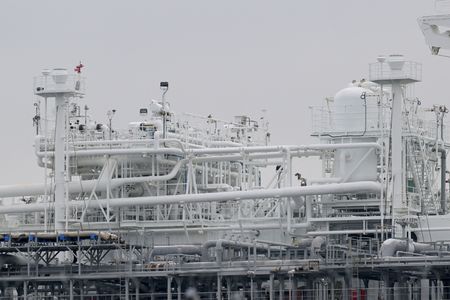By Nathan Vifflin and Leo Marchandon
(Reuters) -ASML, the world’s biggest supplier of computer chip-making equipment, said on Wednesday that tariffs were increasing uncertainty around its outlook for 2025 and 2026, but stood by its annual guidance as the race for AI rages on.
CEO Christophe Fouquet said his conversations with customers supported ASML’s expectations that 2025 and 2026 would be growth years.
“However, the recent tariff announcements have increased uncertainty in the macro environment,” Fouquet said in a quarterly earnings statement.
ASML’s net bookings, the most closely watched figure in the industry, missed estimates in the first quarter at 3.9 billion euros ($4.4 billion).
The Dutch group is ready to pass most of the tariff costs onto customers, CFO Roger Dassen said in a call with reporters.
“The burden of tariffs from our vantage point should be allocated in a fair way,” Dassen said. “We think that those taking it in the United States should, therefore, take the lion’s share of that allocation.”
Dassen also said that ASML’s U.S. operations were an asset because of the talent there, not tariffs.
ASML is the second largest semiconductor equipment manufacturer in the U.S., he said, with about 20% of its workforce there.
Tariffs could cost U.S. semiconductor equipment makers more than $1 billion a year, according to industry calculations discussed with officials, a Reuters report showed Tuesday.
Dassen suggested free trade zones between Europe and the U.S. as an option to limit the cost of tariffs. ASML’s parts get shipped back and forth several times between the continents.
He also warned of the indirect impact on global economic growth, which could slow down the AI supply chain, but said AI expansions plans so far were “very strong, very concrete”.
Dassen also said Chinese demand was stronger than anticipated so far in 2025, while Nvidia took a $5.5 billion charge after the U.S. government Tuesday limited exports there.
The global race for AI has put ASML at the forefront of the industry, as the maker of the world’s most advanced chip circuitry engraving system, the EUV lithography machine, used to make chips designed by Nvidia and Apple.
Artificial intelligence continues to be the main growth driver for ASML, Fouquet said.
“It has created a shift in the market dynamics that benefits some customers more than others, contributing to both upside potential and downside risks as reflected in our 2025 revenue range,” he added about AI.
Analyst Timm Schulze-Melander from Redburn Atlantic said the AI push benefited TSMC and Nvidia more than Intel and Samsung.
“It’s great news that 2025 financial guidance remains unchanged — or even worse than some were fearing, that perhaps guidance would be eliminated entirely,” said Nick Rossolillo of Concinnus Financial which has held ASML shares since 2022.
It forecast second-quarter sales of 7.2 billion to 7.7 billion euros, below analysts’ expectations of 7.73 billion, according to LSEG data. At the top of the range, the sales would be in line with the first quarter.
ASML’s shares were down 5% by 0904 GMT, dragging peers ASM International , BE Semiconductor industries , Soitec , and chipmakers Infineon , STMicroelectronics lower.
($1 = 0.8814 euros)
(Reporting by Nathan Vifflin and Leo Marchandon in Gdansk, editing by Milla Nissi)








